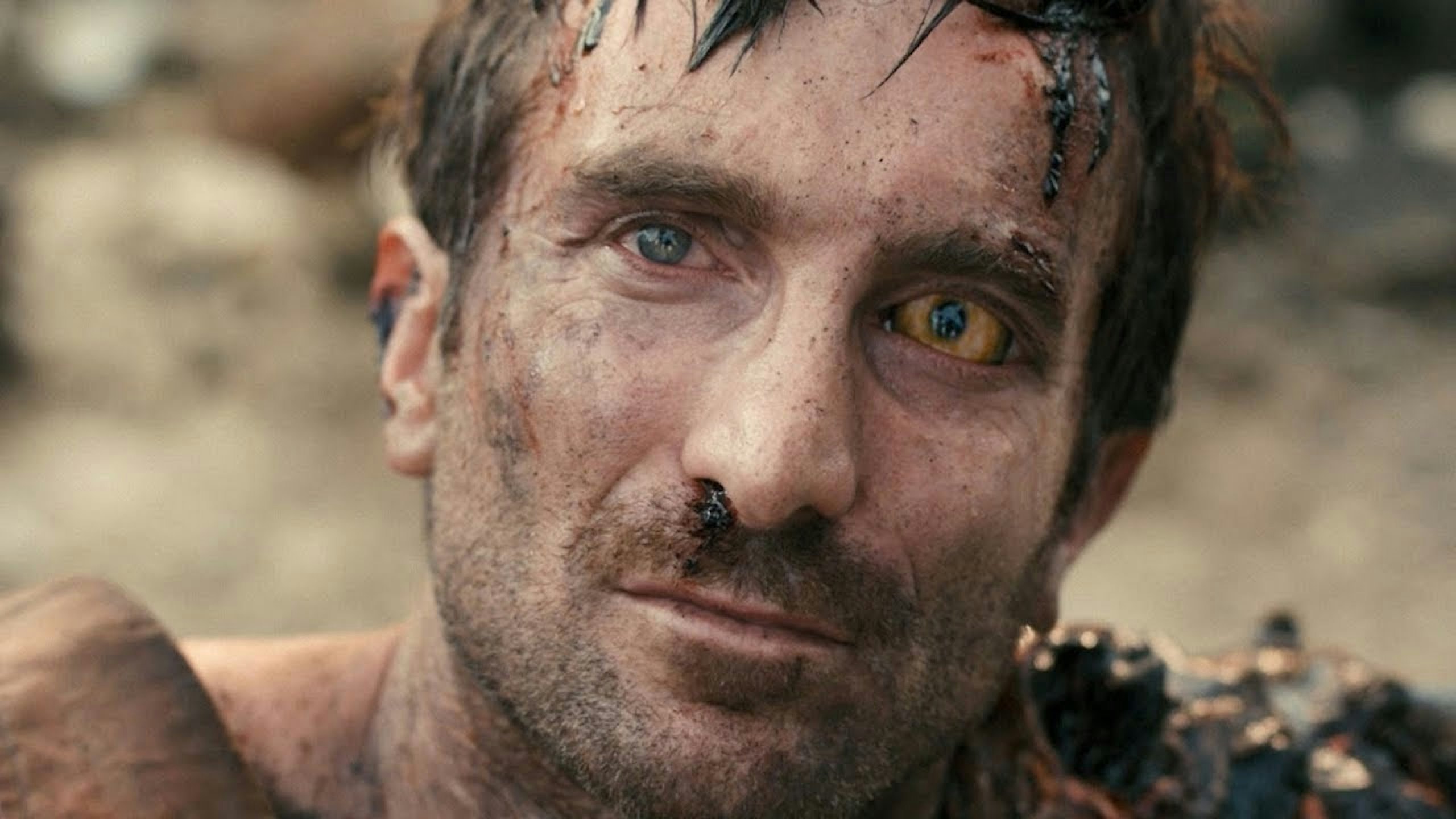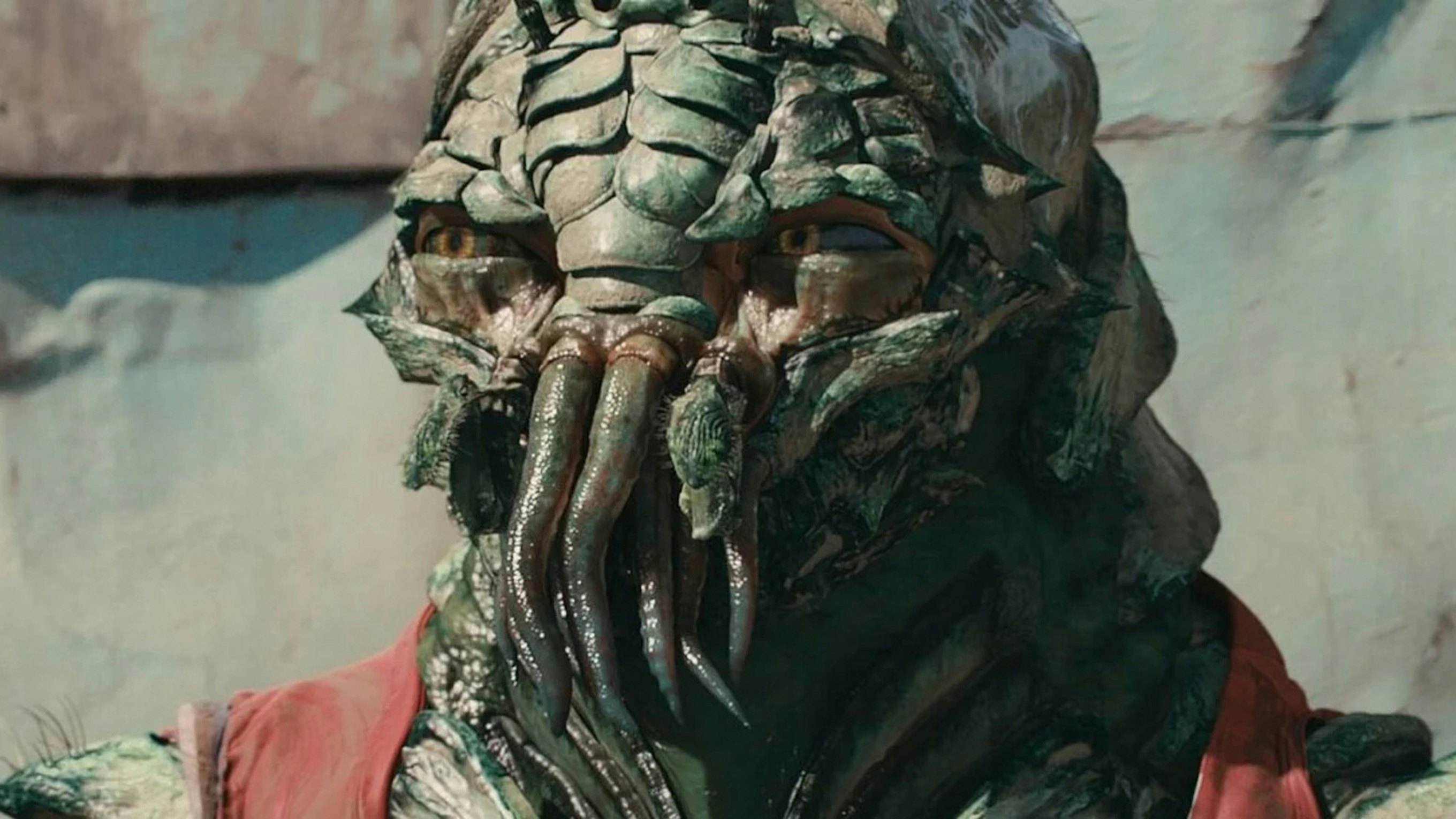
Sci-fi body horror is a familiar cinematic recipe, but the Oscar-nominated District 9 put a fresh spin on it when it hit theaters on August 14, 2009. Sandwiched between a slick Star Trek reboot in May and the nearly three-billion-dollar 3D phenomenon of Avatar in December, District 9 managed to distinguish itself as a scrappier piece of science fiction: part pseudo-documentary, part social commentary, part splatter film. The catch, amid the exploding heads, is that the main character’s own grotesque bodily transformation renders him more empathetic — arguably, more human.
Fifteen years later, District 9 feels just as urgently new as it did when it was released. And its main strength is its ability to use the trope of body horror in a science fiction context that feels utterly naturalistic.
We begin with the bureaucratic dweeb, Wikus (Sharlto Copley), who goes from a desk job in Alien Affairs to a field operation serving eviction notices to an extraterrestrial species nicknamed the prawn. The setting is Johannesburg, South Africa, where the aliens have been herded into a “temporary camp” that’s really a crime-ridden slum and militarized holding zone. As he ventures into the camp, Wikus tells the audience, “We try to engage with the prawn,” and his idea of that involves taking souvenirs from the eggs he’s casually aborted on camera (“almost like a popcorn,” he enthuses as they burn).
To see this kind of edgy character detail play out in a widescreen genre film that’s not based on any studio IP is unique to its time, and a welcome departure from the Hollywood norm. Promoted with the indelible image of a spaceship hovering over a barbed-wire shantytown, District 9 had the blockbuster backing of Peter Jackson as co-producer. Yet writer-director Neill Blomkamp was still an unknown quantity at the time. His six-minute short film, Alive in Joburg, acted as a proof of concept, but District 9 was his feature filmmaking debut.

Alive in Joburg name-dropped the apartheid political body and referred to it “exploiting people’s fears,” and in its location and title, District 9 nods further to the forcible removal of residents in South Africa’s real-life District Six. As he violates alien civil rights, Wikus thus emerges as an agent of institutionalized racism and xenophobia. He and the other human characters never refer to the bug-like aliens as anything other than “prawn,” though it’s explained as a derogatory term, the intergalactic equivalent of a racial epithet. One interviewee unselfconsciously claims, “If they were from another country, we might understand, but they are not even from this planet at all.”
To academics, the prawn are the proletariat: underfed, working-class aliens seeking refuge on earth. Found-footage scenes nonetheless frame them as animalistic troublemakers, setting fires and eating tires and cat food without can openers. First dubbed “the poleepkwa” in Alive in Joburg, their name here also alludes to the Parktown prawn, or African king cricket, a common household pest.
Smartly, from the outset, talking heads refer to Wikus in the past tense, so we know something bad has happened to him in District 9 among the prawn. When he accidentally sprays himself with fluid from a cylinder hidden in one alien’s shack, it leaves him coughing, vomiting, shedding fingernails and teeth, and nursing a black nosebleed and broken arm. The arm metamorphosizes into a squishy tentacle, and Wikus is soon bagged up and wheeled into a bio-lab, where his own father-in-law oversees him being poked and cattle-prodded. Only a subject with prawn DNA can operate their weapons, and since Wikus now represents “maybe billions of dollars’ worth’ of bio-technology,” his father-in-law quickly consents to the harvesting of his soft tissue.
It’s when Wikus escapes the lab that District 9 takes an interesting turn into fugitive compassion. Wikus himself resists this turn, refusing to believe that he and the prawn are alike or capable of relating as intelligent beings. Even after he’s infected, he reviles the thought of interspecies mating, but the media brands him as “highly contagious” due to “prolonged sexual activity with aliens.” He immediately becomes a pariah, driven to the desperation of unsuccessfully chopping off his new alien arm with a hatchet.
The visceral impact of this moment helps service a greater emotional journey, which the viewer undergoes with Wikus. Only in District 9 — the same slum where he threatened to send alien offspring to child services — does he find sanctuary. He and the prawn tech scavenger, Christopher Johnson (Jason Cope), are initially thrust together out of self-interest.

They both want to go home, but as Wikus mutates into the very sort of creature he disdained, he reaches a point where he no longer has to be bribed to act selflessly and aid Christopher. The man turned prawn becomes a physical manifestation of learned empathy, skin peeling away to reveal a changed person. He even learns to value the alien arm he was ready to severe, especially when a Nigerian gang leader deems it edible.
Over and above its body horror, District 9 owes a certain debt to Aliens (and the tradition of military science fiction in general) in its paramilitary action and power-loader-like mechs. At one point, Blomkamp was attached to a potential fifth film in the Alien series; he shared concept art for it on Instagram, but the reins ultimately passed to Fede Alvarez for Alien: Romulus, in theaters this weekend.
Still, imagine if a more bumbling, redeemable version of Paul Reiser’s corporate representative were the protagonist of Aliens. That’s what it’s like watching Wikus unravel in District 9, looking back with one yellow eye on the world of greed and anti-immigrant prejudice he’s left behind. Like the best science fiction, District 9 simply puts an alien face on a very human set of circumstances.







